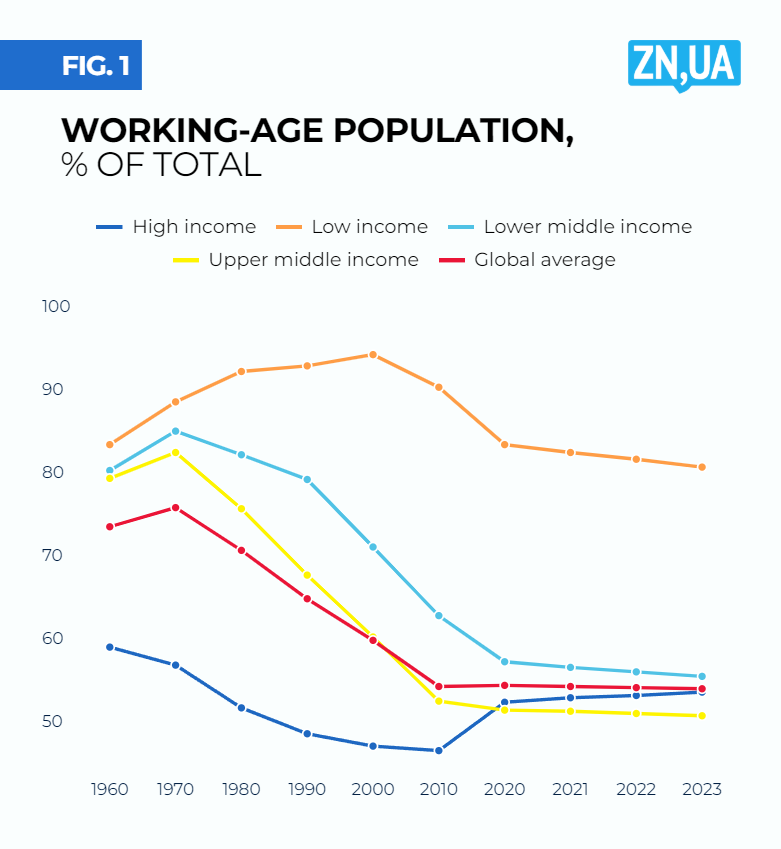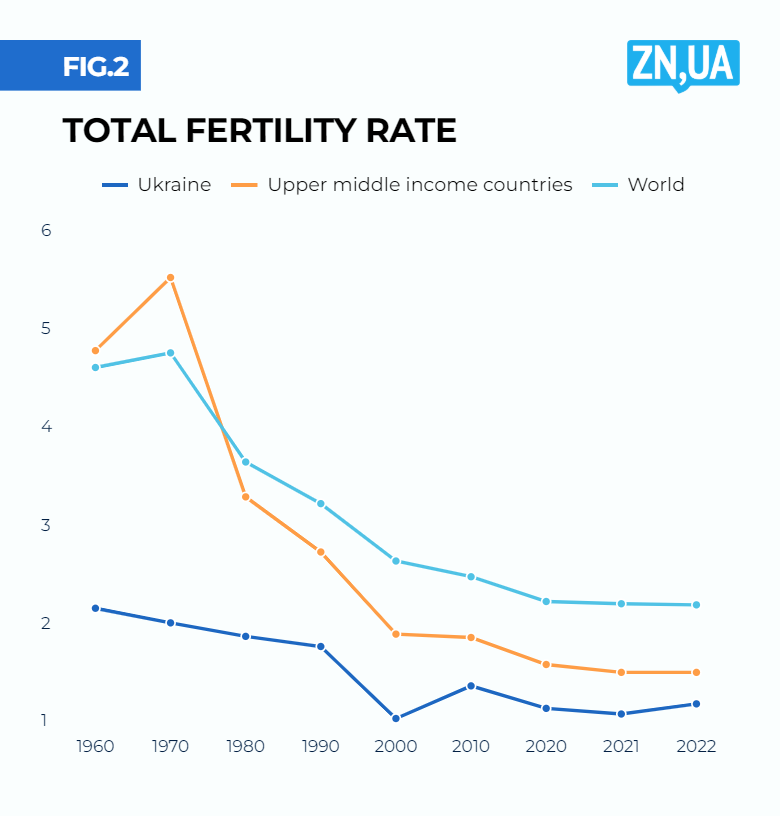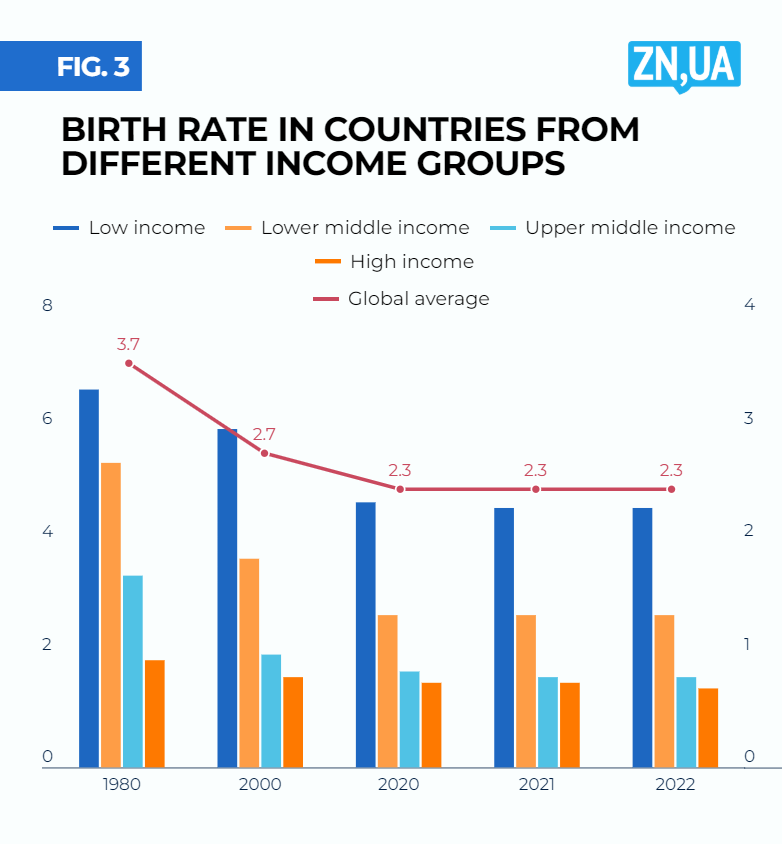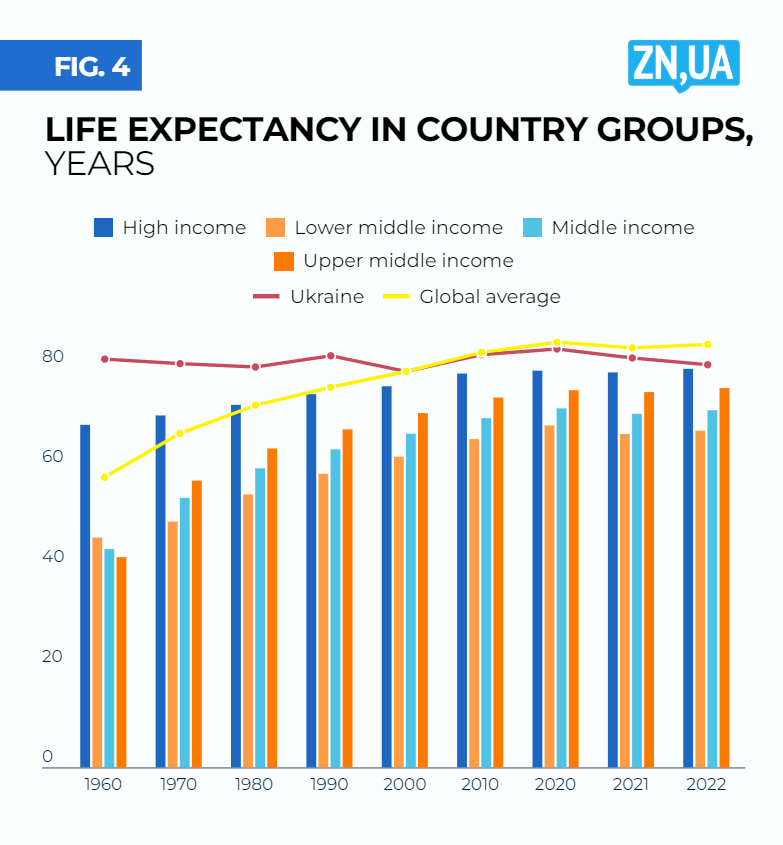Gray Is The New Black: How Population Ageing Is Changing Global Economy — And Ukraine
A distributor of dental products is looking for a sales representative. Work experience is not necessary; the main thing is that he or she should be between 20 and 35 years old. A wedding salon needs a sales assistant, without bad habits, not older than 45 years old. A cafe in the capital is looking for a cook, preferably a woman, preferably under 50. A conference hall is looking for an administrator, responsible, punctual, under 30.
Unfortunately, these examples were not few and far between. Ageism is rife in the Ukrainian labor market, despite the fact that there is already a shortage of workers.
In a recent report on this problem, the National Institute for Strategic Studies (NISS) notes that, according to a survey, 64 percent of its participants who have reached the age of 40 had problems finding a job for this very reason. At the same time, NISS experts emphasize that the existing legal framework in this area is mostly declarative, there is no anti-discrimination policy in the country as such, there is no monitoring and collection of discrimination facts, and there are no effective methods of punishing violators. We are definitely not ready to live in an ageing world. And it is closer than we think.
A recent report from the World Economic Forum (WEF) with the unjustifiably poetic title The Longevity Economy paints a dire forecast of how human demographics will change and what the consequences of these changes will be. Well, prosperity is a likely prospect only for those countries that start preparing for the new reality, where the number of elderly people will grow. There will be few of them because, according to the WEF, most advanced economies will have to at least double their productivity to maintain their usual level of development, all while facing a shortage of working-age people (see Figure 1). Unfortunately, in most countries, after a dramatic decline in the share of working-age people in the early 2000s, the percentage of working-age people has continued, albeit less sharply, to decline steadily. Only high-income countries are experiencing a reverse trend thanks to the inflow of migrants, but even proactive migration policies do not allow these countries to return to the levels seen at the end of the last century.
The current anxiety that AI will replace humans in entire productive sectors should be replaced by anxiety that it will not do so quickly enough to double current labor productivity before the peak of demographic change.
Given the current circumstances, Ukraine's ability to meet these challenges is not even worth assessing. It is enough to look at our birth rate compared to the average level of the countries in our group and the world as a whole. They at least still have a sufficient number of 55-year-olds born in the last peak in the 1970s, while we don't even have that (see Figure 2). Our fertility rate is one of the lowest in the world at 1.26, and this drop was preceded by a demographic pit in the early 2000s, when the birth rate was 1.21, Before that, Ukraine saw a smooth slide from 2.24 in the 1960s to 1.85 in the 1990s.
Big sad data
It's no news that the birth rate is falling in half of the world's countries, while life expectancy is rising. In 2023, the global fertility rate averaged 2.3 children per woman, slightly higher than the replacement level, but this is achieved mainly thanks to poor countries (see Figure 3). With an average of 2.3 children per woman of childbearing age, low-income countries boast a fertility rate of 4.6 children per woman, whereas rich and middle-income countries have fertility rates of 1.4 and 1.6, respectively. Even in lower-middle-income countries, fertility rates have been declining rapidly since the late 1980s, from 5.4 to 2.7. The population in sub-Saharan Africa is expected to increase by 750 million over the next 25 years. This region will remain the only one where the birth rate will not fall in the next quarter century.
If 2050 seems like a distant future to you, remember that Ridley Scott's Gladiator and the song Let Go by the Ukrainian rock band Okean Elzy were released in 2000. The '50s will be on the horizon in the blink of an eye.
Since the mid-1970s, countries that we consider to be part of the developed world have been giving birth to fewer and fewer children. At the same time, the life expectancy of people in the richer world is increasing. In the end, according to WEF experts, by 2050, every sixth person in the world will be over 65. However, in Europe and North America, this figure will rise to one in four people, and in the “frontrunners” of ageing, such as Japan, South Korea and Italy, one in three people will be 65 or older.
Ukraine could have been in the same club because it has similarly low birth rates — if it was not for the lower life expectancy (see Figure 4). No, this is not good news: the basic survival plan proposed by WEF experts is to involve older people more in labor markets to deal with scarce labor. Unfortunately, it will not work for us either. Despite the general upward trend, life expectancy in Ukraine has been hovering around 68–70 years since the late 1960s. On average, a Ukrainian lives five years less than a Pole and ten years less than a German. There are many reasons for this, from lifestyle to the quality of medical services and disease prevention. But it is obvious that a full-scale war will not improve this indicator.
The age structure of society affects everything
The biggest concern is certainly the future of existing pension systems, or rather, the lack thereof. The current pension systems are not designed for the present demographic balance, and their crisis is inevitable. Even in very rich countries, retirement for the majority of people is a guaranteed decline in living standards. In a crisis of pension systems, it will no longer be a matter of decline; it will be a matter of impoverishment. Existing pension systems are inflexible, largely voluntary and, most importantly, premised on the idea of reaching a certain retirement age and a fixed final payment (minimum pension). In contrast, the new conditions will require rather fixed contributions and consideration of the duration of retirement. The analysts' advice is standard: diversification of financial risks, mandatory participation of all citizens in pension systems, motivation for higher voluntary contributions, etc.
Nonetheless, everyone recognizes that in the new world, the only salvation for the elderly will be personal savings and passive income. For some countries, this issue is being addressed by increasing financial literacy and awareness of available investment opportunities. Others, including Ukraine, should start by creating at least some investment instruments other than bank deposits. For example, we can start with a simple question: why do we have a National Securities and Stock Market Commission, but no stock markets?
The problem common to all is the general unwillingness of people of working age to think about retirement savings at all. One in three Europeans does not save anything for retirement. Every fourth Australian has no retirement savings, as does every fifth American over 50. In Asian countries, the situation is even worse: from 50 percent of people in China to 95 percent in Vietnam do not know how they are going to make a living in retirement.
However, there is also panic in the ranks of the financially conscious: according to a research by Global Retail Investor Survey, 44 percent of 13,000 private investors from 13 developed countries are afraid of outliving their retirement savings, i.e., that savings will run out, but life will go on.
***
Demographic changes are destroying the foundations of modern economies, which were built on a growing birth rate. Our economy is no exception. Therefore, the key to our survival will be to significantly extend our working lives and inclusiveness. This challenge is difficult not only because of the unpopularity of raising the retirement age but also because the labor market is not ready for an ageing workforce — think of the job ads above.
Ageism, multiplied by the difficulty of adapting to a career change and technological development faced by adults, is a difficult obstacle.
But if Ukraine is to survive and live, the government will have to do a lot of work. It will have to provide access to continuing education and retraining, implement pension and social support reforms, promote alternative opportunities for independent savings and explain the importance of these savings every step of the way. And, of course, together with businesses, we must combat age discrimination and expand employment opportunities with limited productivity because ageing inevitably implies physiological limitations. Unfortunately, all of these are challenging tasks that will take years to accomplish. And no one has even gotten around to thinking about them yet.
Global changes are also unlikely to spare Ukraine, as ageing will transform global demand. Older people are more economical, less wealthy and have different consumption habits. Producers and exporters will have to adapt to new preferences that are far removed from the previous era of overconsumption. Of course, it won't happen overnight, but markets will change, which means that producers will have to change.
Countries that proactively adapt their economies, pension systems and labor markets to age-related changes will have a chance to prosper. And for Ukraine, with its birth rate crisis and labor migration, timely adaptation to the economic “silver age” is critical.
Please select it with the mouse and press Ctrl+Enter or Submit a bug





















 Login with Google
Login with Google